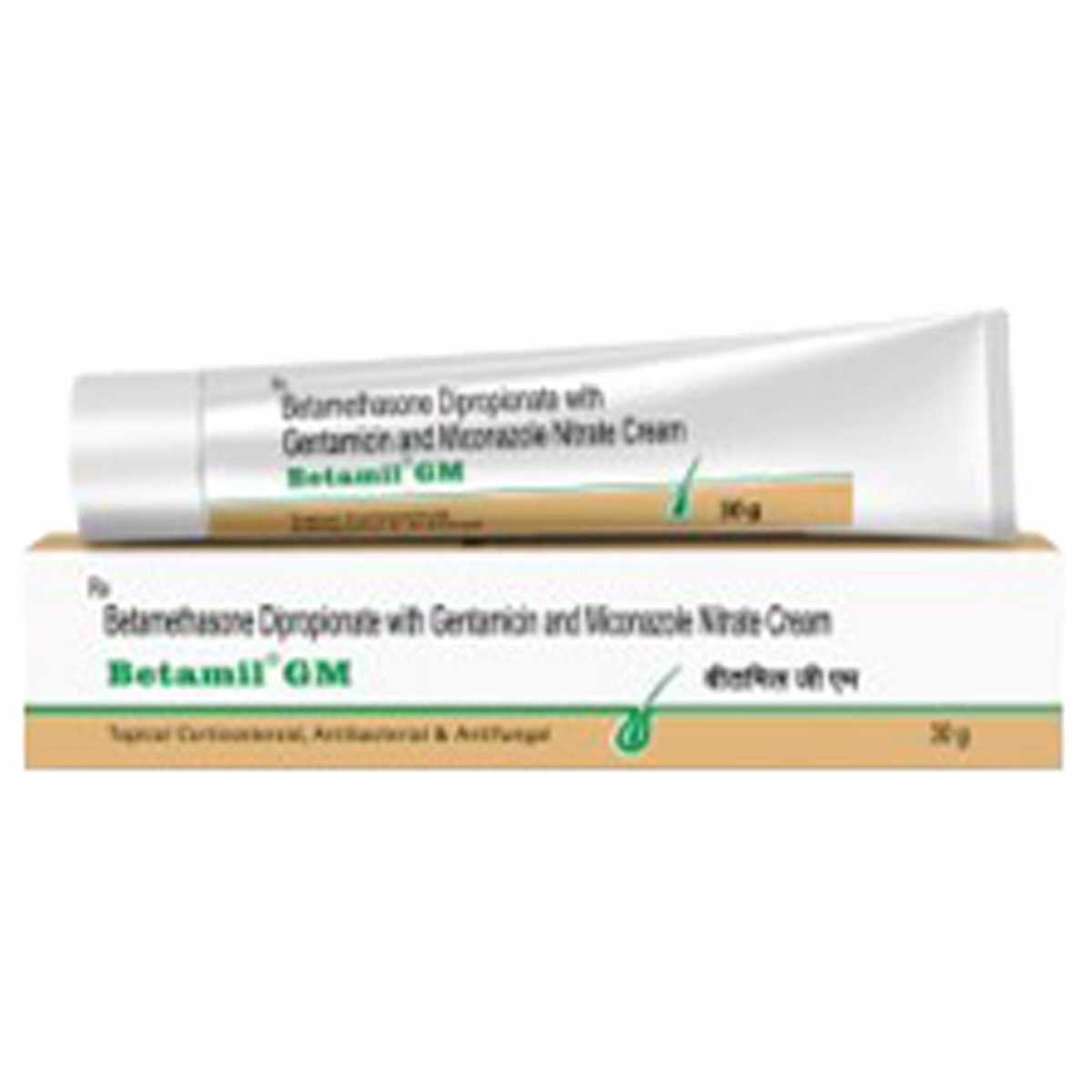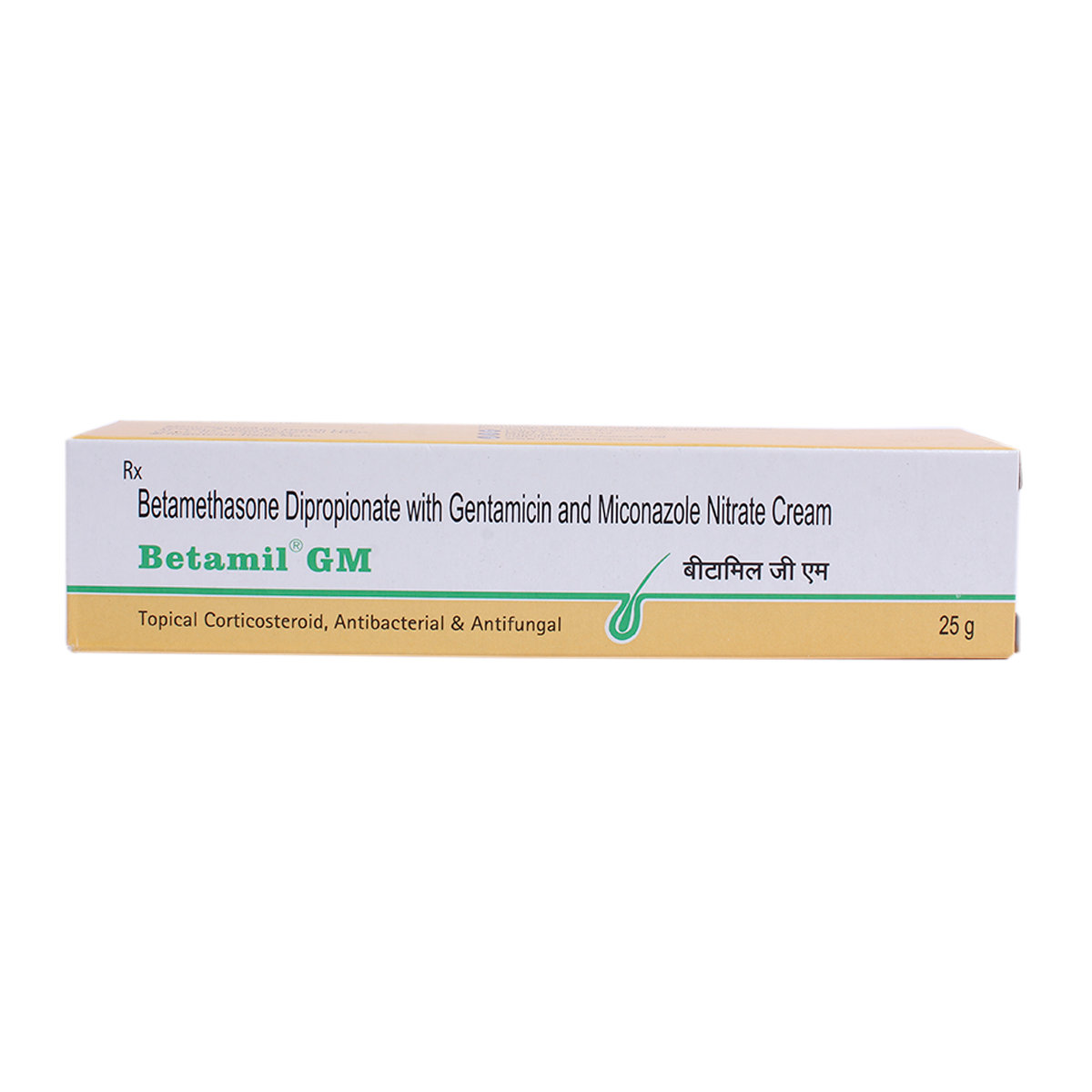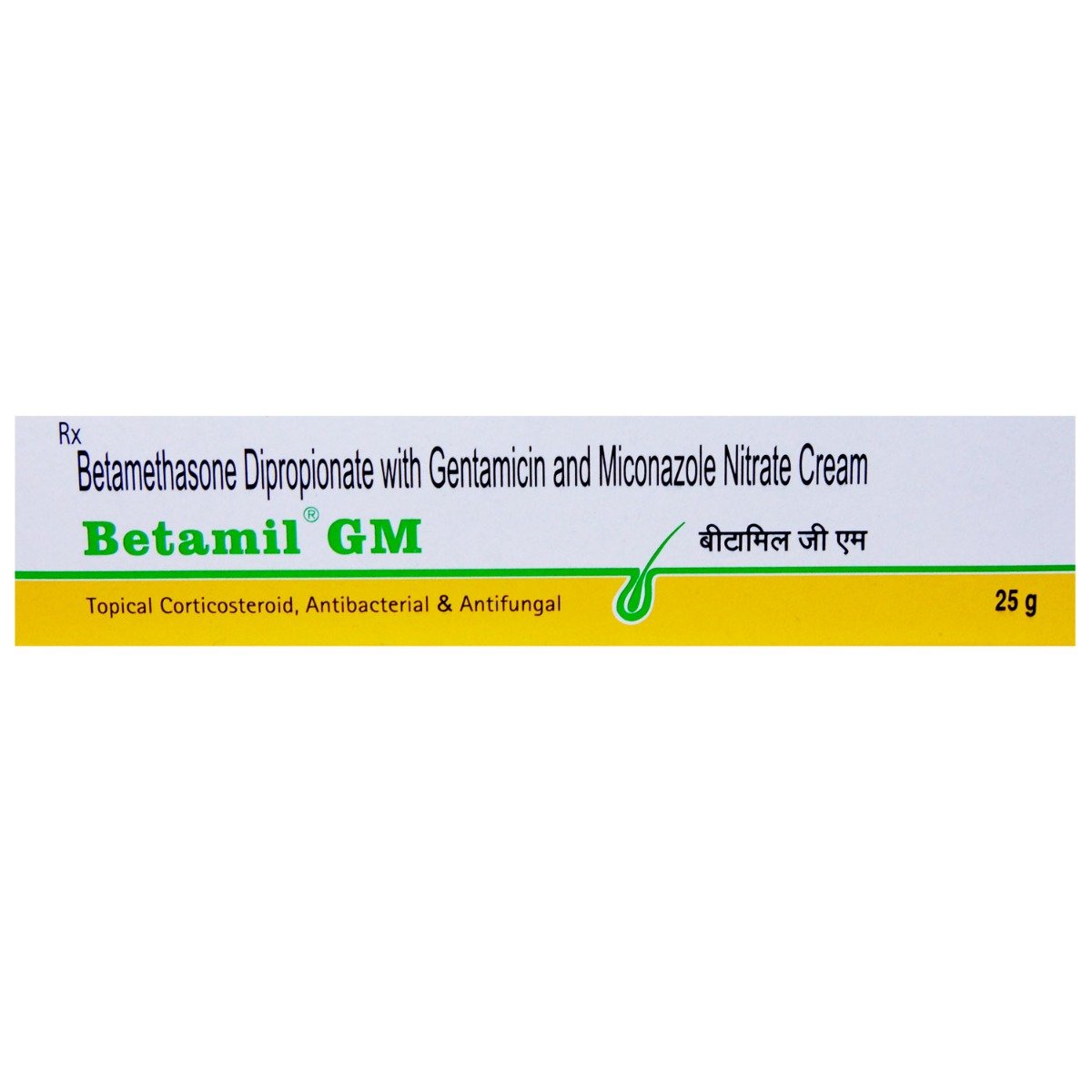- Home
- Tafgm Cream
Tafgm Cream Substitute
Tafgm Cream Substitute
Medicine Composition:
BETAMETHASONE-0.05%W/W+GENTAMICIN-0.1%W/W+MICONAZOLE-2%W/WAll Substitutes & Brand Comparisons
RX
Betamil GM Cream 30 gm
Procter & Gamble Health Ltd
₹54
(₹1.62/ 1gm)
75% CHEAPERRX
Betamil GM Cream 25 gm
Merck Ltd
₹54
(₹1.94/ 1gm)
70% CHEAPERRX
Out of StockBetamil GM Cream 20 gm
Merck Ltd
₹47.5
(₹2.14/ 1gm)
67% CHEAPERRX
Dipnate Gm Cream 15gm
Karlin Pharmaceuticals & Exports Pvt Ltd
₹74
(₹4.44/ 1gm)
32% CHEAPERRX
Out of StockCortiderm GM Cream
Bal Pharma Ltd
₹80
(₹4.8/ 1gm)
26% CHEAPERRX
Lupiderm GM Cream 10 gm
Lupin Ltd
₹79
(₹7.11/ 1gm)
8% COSTLIER

When Should You Consider Switching from Tafgm Cream?
Patients may explore substitutes in the following scenarios:
- High monthly cost of Tafgm Cream
- Non-availability in local pharmacies
- Generic recommendation by a doctor
- Side effects or better tolerability with alternatives
What to Know Before Switching
Before you switch from Tafgm Cream to another medicine, here are some important points to keep in mind:
Same salt, different brands:
Most substitutes contain the same active ingredient - BETAMETHASONE-0.05%W/W+GENTAMICIN-0.1%W/W+MICONAZOLE-2%W/W, but the fillers, coating, or manufacturing quality may vary slightly.
Consult your doctor first:
Even if the salt is the same, your doctor can confirm if the substitute is right for your condition, dosage, and health history.
Watch out for allergies or reactions:
Some people may react differently to certain brands due to inactive ingredients. If you notice any side effects, inform your doctor immediately.
Price ≠ effectiveness:
A lower-priced substitute doesn't mean it's less effective. Many generic medicines work just as well as branded ones.
Check the dosage form and strength:
Always match the substitute’s strength (e.g., 5mg, 10mg) and form (tablet, capsule, syrup) with what your doctor prescribed.
Uses
Tafgm Cream is used in the treatment of bacterial and fungal skin infections. The detailed uses of Tafgm Cream are as follows:
- Eczema management: Tafgm Cream relieves afflicted regions by lowering eczema-related inflammation, itching, and redness.
- Psoriasis Treatment: It can be used to treat psoriasis symptoms, such as pain and scaling, by encouraging skin hydration and healing.
- Allergic Reaction Relief: Tafgm Cream efficiently soothes inflamed skin by reducing allergic skin reactions.
- Dermatitis Control: This medication helps soothe inflamed skin and reduce swelling in various forms of dermatitis.
- Antifungal Activity: Tafgm Cream contains an antifungal ingredient that helps cure fungal skin infections and provides targeted treatment for conditions like athlete's foot and ringworm.
Medicinal Benefits
Tafgm Cream is a combination of three drugs: Betamethasone, Gentamicin, and Miconazole. Tafgm Cream is used to treat fungal and bacterial skin infections. Also, Tafgm Cream helps to reduce swelling, itching, and redness caused by specific skin problems. Betamethasone is a corticosteroid that acts inside skin cells and inhibits the release of certain chemical messengers in the body that cause redness, itching, and swelling. When the skin reacts to allergens, these chemicals are usually released. Gentamicin is an antibiotic that causes bacteria to produce faulty and abnormal proteins. Thus, it kills the bacteria and clears the infection. The fungal cell membranes are essential for their survival as they prevent the entry of unwanted substances into the cells and stop the leakage of cell contents. Miconazole is an antifungal that works by causing holes in the fungal cell membranes and kills fungi.
FAQs
The substitutes of Tafgm Cream contain the same active salt(s) - BETAMETHASONE-0.05%W/W+GENTAMICIN-0.1%W/W+MICONAZOLE-2%W/W. However, they may differ in price, manufacturing quality, and inactive ingredients. Speak to your doctor to find a suitable option.
Switching to a generic substitute medicine in the place of Tafgm Cream is often possible if it has the same salt, strength, and dosage form. But always check with your doctor before making any changes to your medication.
Generics versions of Tafgm Cream are typically more affordable because they don’t include the original brand's research, development, and marketing costs. They contain the same active ingredient and are approved for safety and effectiveness.
Most people don’t notice any difference. However, some may react to different fillers or coatings. If you notice any unusual symptoms after switching, consult your doctor.
Make sure the new medicine has the same active salt, strength, dosage form. Always confirm the change with your doctor or pharmacist.
Substitutes of Tafgm Cream meet the same safety and efficacy standards as Tafgm Cream, but small differences in absorption or formulation can exist. A doctor can help you choose the right one for your needs.
Yes. Substitutes of Tafgm Cream may vary in color, size, or shape due to differences in manufacturing and branding, but this does not affect how they work.
Yes, it’s generally safe to switch between multiple substitutes of Tafgm Cream if they have the same salt and strength. However, always inform your doctor so they can monitor how your body responds.
Yes, many people safely use substitutes of Tafgm Cream for long-term treatment. Just ensure it’s done under medical supervision.
If your symptoms stay under control or lab results remain stable, the substitute for Tafgm Cream is likely working well. Regular follow-ups with your doctor are important.
Absolutely. Even with the same salt, small differences can affect how your body responds when switching from Tafgm Cream to its substitute. Always consult your doctor before switching.
Tafgm Cream is used to treat bacterial and fungal skin infections. It works by killing the infection-causing organisms and inhibiting chemical messengers in the body that cause redness, itching, and swelling.
No, Tafgm Cream is not used to treat diaper rash as using Tafgm Cream under child’s nappy enables Tafgm Cream to pass through the skin easily and cause adverse effects. However, please consult a doctor before using Tafgm Cream in children.
Yes, Tafgm Cream may cause skin irritation at the site of application as a side effect. However, if the irritation worsens or persists, stop using Tafgm Cream and consult a doctor.
You are recommended to cover the treated area of skin with bandages or dressings only if advised by your doctor else it may increase the risk of side effects.
You are recommended to use Tafgm Cream for as long as your doctor has prescribed it. However, if the condition persists or worsens after 1 week of treatment with Tafgm Cream, please consult a doctor.
Yes, fungal infection is a contagious skin condition which spreads from one person to another through direct skin to skin contact or by contact with contaminated soil or surfaces and infected animals. Therefore, it is recommended to avoid close direct contact until the infection is clear and avoid sharing things with the infected person as it can also spread the infection.
No, you are not recommended to stop using Tafgm Cream without consulting your doctor as it may worsen the condition or cause recurring infection. Therefore, take Tafgm Cream for as long as your doctor has prescribed it, and if you experience any difficulty while taking Tafgm Cream, please consult your doctor.
Tafgm Cream is not recommended for use on the face for spots as it contains betamethasone, a corticosteroid which may cause skin thinning and redness.
Tafgm Cream is not recommended for pimples or acne because Tafgm Cream contains betamethasone, a corticosteroid can sometimes worsen acne.
Tafgm Cream can be applied on the face only if the doctor has recommended it based on your medical condition.
You may experience side effects like difficulty breathing, dizziness, redness and itching at the site of application if you are allergic to Tafgm Cream. Consult the doctor if you notice any of these symptoms.
You should not stop using Tafgm Cream even though you feel better as it may worsen the condition or cause infection to recur. Always use Tafgm Cream for the duration the doctor has prescribed it.
Tafgm Cream can be used with caution and only if the doctor has prescribed it. Please consult the doctor if you have any concerns.
Tafgm Cream is for external use only. Apply a small amount on your fingertip and gently spread as a thin layer over the clean, dry affected area as prescribed by the doctor.
If Tafgm Cream comes in contact with eyes, rinse off with plenty of water thoroughly. If you still feel any discomfort consult the doctor immediately.
The side effects of Tafgm Cream include dry skin, itching, skin peeling, redness, irritation, or burning sensation at the site of application. Consult the doctor if any of these side effects persist or worsen.
If you have missed the dose, apply Tafgm Cream as soon as you remember. If it's nearly time for your next dose, skip the missed dose.
No, Tafgm Cream should not be used for fairness as it is used to treat fungal and bacterial infections of the skin and helps to reduce itching, swelling, and redness caused by certain skin problems.
Tafgm Cream should be used as a doctor has prescribed it. The doctor will determine the duration of treatment based on your medical condition.
Tafgm Cream is not recommended for use in private parts. Consult the doctor if you have any concerns.
Yes, Tafgm Cream is used for fungal skin infections. It works by killing the infection-causing organisms and inhibiting chemical messengers in the body responsible for redness, itching, and swelling.
Yes, Tafgm Cream can be used for ringworm as it is a fungal infection. It works by killing the micro-organisms and helps to treat the infection.
No, Tafgm Cream is not recommended to treat pigmentation as it is indicated for the treatment of skin infections.
Tafgm Cream starts working as soon as you apply it. However, it may take several days to weeks for your symptoms to improve.
Avoid prolonged or excessive usage of Tafgm Cream. Use only as prescribed by the doctor. Avoid contact with eyes, nose, mouth and ears. If Tafgm Cream comes in contact accidentally with these areas, rinse off with plenty of water. Do not cover the treated areas and avoid using it on sensitive areas. Consult the doctor before using Tafgm Cream if you have diabetes, glaucoma, asthma, cataracts, Parkinson’s disease, adrenal gland problems, kidney problems, myasthenia gravis (muscle weakness), or other skin problems.
You should not use higher than the recommended dose of Tafgm Cream or for long periods as it may cause adverse effects. You should use Tafgm Cream in doses and duration prescribed by the doctor based on your health condition.
Tafgm Cream should be stored in a cool and dry place away from sunlight. Keep it out of sight and reach of children.
Consult the doctor before taking Tafgm Cream with other medicines to avoid any interactions/side effects.
Avoid using Tafgm Cream if you are allergic to any of the ingredients as it may cause side effects like difficulty breathing, dizziness, redness and itching at the site of application.
Tafgm Cream should be used during pregnancy or breastfeeding if prescribed by the doctor. Consult the doctor before using Tafgm Cream if you are pregnant or breastfeeding. The doctor may prescribe it if the benefits outweigh its risks.
Buy best Dermatology products by
Glenmark Pharmaceuticals Ltd
Canixa Life Sciences Pvt Ltd
Klm Laboratories Pvt Ltd
Sun Pharmaceutical Industries Ltd
Cipla Ltd
Intas Pharmaceuticals Ltd
Ajanta Pharma Ltd
East West Pharma India Pvt Ltd
Dr Reddy's Laboratories Ltd
Abbott India Ltd
Brinton Pharmaceuticals Ltd
Skinocean Pharmaceuticals
Leeford Healthcare Ltd
Amwill Healthcare Pvt Ltd
Alkem Laboratories Ltd
Atopic laboratories Pvt Ltd
Hegde & Hegde Pharmaceutica Llp
Torrent Pharmaceuticals Ltd
Palsons Derma Pvt Ltd
Dermacia Healthcare
Oaknet Healthcare Pvt Ltd
Yaher Pharma
Ipca Laboratories Ltd
Med Manor Organics Pvt Ltd
Micro Labs Ltd
Dermocare Laboratories Gujarat Llp
Talent India Pvt Ltd
Apex Laboratories Pvt Ltd
Mankind Pharma Pvt Ltd
Kivi Labs Ltd
Nemus Pharmaceuticals Pvt Ltd
Systopic Laboratories Pvt Ltd
Menarini India Pvt Ltd
Regaliz Medicare Ltd
Ethinext Pharma
Zydus Cadila
Inex Medicaments Pvt Ltd
Mohrish Pharmaceuticals Pvt Ltd
Lupin Ltd
Newtrimed Healthcare Pvt Ltd
Hbc Dermiza Healthcare Pvt Ltd
Mrhm Pharma Pvt Ltd
Praise Pharma
Zydus Healthcare Ltd
Eskon Pharma
GlaxoSmithKline Pharmaceuticals Ltd
La Pristine Bioceuticals Pvt Ltd
Wallace Pharmaceuticals Pvt Ltd
Glowderma Lab Pvt Ltd
Biocute Life Care
Sol Derma Pharmaceuticals Pvt Ltd
Macleods Pharmaceuticals Ltd
Aurel Biolife
Ethicare Remedies Pvt Ltd
Galcare Pharmaceuticals Pvt Ltd
Percos India Pvt Ltd
Rockmed Pharma Pvt Ltd
Kaizen Drugs Pvt Ltd
Connote Healthcare
Elder Pharmaceuticals Ltd
Rely On Pharmaceuticals
Zee Laboratories Ltd
Karlin Pharmaceuticals & Exports Pvt Ltd
Yap Bioceuticals
Wockhardt Ltd
Alniche Life Sciences Pvt Ltd
Gary Pharmaceuticals Pvt Ltd
La Med Healthcare Pvt Ltd
Prism Life Sciences Ltd
Rhine Biogenics Pvt Ltd
Akumentis Healthcare Ltd
Apple Therapeutics Pvt Ltd
Leogard Pharmaceuticals Pvt Ltd
Lyra Laboratories Pvt Ltd
P and P Dermaceuticals Pvt Ltd
Adonis Laboratories Pvt Ltd
Arka Vital Science Pvt Ltd
Eumedica Pharamceuticals
Indiabulls Pharmaceuticals Pvt Ltd
Albatross Healthcare Pvt Ltd
Yash Pharma Laboratories Pvt Ltd
Capital Pharma
Dermajoint India
Dermarex HealthCare India Pvt Ltd
Iceberg Health Care Pvt Ltd
Glasier Wellness Inc
Grace Derma Healthcare Pvt Ltd
Oziel Pharmaceuticals Pvt Ltd
Bioswizz Pharmaceuticals Ltd
FDC Ltd
Medcure Organics Pvt Ltd
Salve Pharmaceuticals Pvt Ltd
West Coast Pharmaceuticals Pvt Ltd
Entod Pharmaceuticals Ltd
Jenburkt Pharmaceuticals Ltd
Olcare Laboratories Pvt Ltd
Anhox Healthcare Pvt Ltd
Biochemix Health Care Pvt Ltd
Indchemie Health Specialities Pvt Ltd
Indolands Pharma Pvt Ltd
BODY CREAM
Body Lotion
Soap
Face Cream
Shampoo
Sun Screen
Face Gel
Face Wash
HAIR SOLUTION
BODY GEL
Face Serum
Hair Serum
Hair Lotion
Dusting Powder
ANTISEPTIC
Body Wash
Face Lotion
FACE CLEANSER
Body Spray
Foot Cream
Conditioner
Eye Cream
Eye Gel
Cleanser
Hair Cream
Hair Gel
Hair Spray
FUNGAL INFECTION
Hair Oil
Sanitizer
Specialty Supplements
Face Mask
Skin Ointment
Lip Balm
Capsule
Eye Serum
Intimate Wash
Hand Cream
Facial Spray
Face Toner
Hair Mask
Hand Wash
SPECIALITY SUPPLEMENT
Tablet
BABY SUNSCREEN
Body Butter
Body Scrub
EYE SOLUTION
FACIAL WIPE
Gargle
Hair Color
Hair Tonic
Intimate Spray
Lip Serum
VITAMIN D





